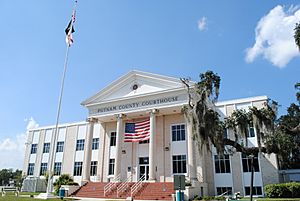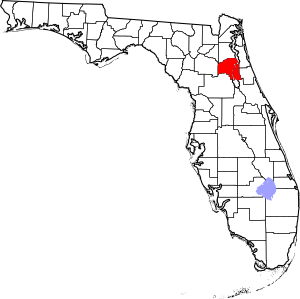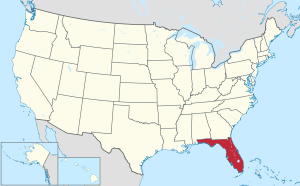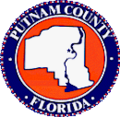Putnam County, Florida facts for kids
Quick facts for kids
Putnam County
|
||
|---|---|---|

Putnam County Courthouse
|
||
|
||

Location within the U.S. state of Florida
|
||
 Florida's location within the U.S. |
||
| Country | ||
| State | ||
| Founded | January 18, 1849 | |
| Named for | Benjamin A. Putnam | |
| Seat | Palatka | |
| Largest city | Palatka | |
| Area | ||
| • Total | 827 sq mi (2,140 km2) | |
| • Land | 728 sq mi (1,890 km2) | |
| • Water | 99 sq mi (260 km2) 12.0%% | |
| Population
(2020)
|
||
| • Total | 73,321 | |
| • Density | 101/sq mi (39/km2) | |
| Time zone | UTC−5 (Eastern) | |
| • Summer (DST) | UTC−4 (EDT) | |
| Congressional district | 6th | |
Putnam County is a place in northern Florida. In 2020, about 73,321 people lived there. The main city, or 'county seat,' is Palatka.
Putnam County is part of a larger area that includes Palatka. It's located right in the middle of several bigger cities. These include Jacksonville, Gainesville, St. Augustine, and Daytona Beach.
Contents
Discovering Putnam County's Past
Putnam County was created in 1849. It was the 28th county made in Florida. It was formed from parts of five other counties: St. Johns, Alachua, Orange, Duval, and Marion.
The county was named after Benjamin A. Putnam. He was an officer in the First Seminole War. He was also a lawyer and a lawmaker in Florida. Benjamin A. Putnam was the first president of the Florida Historical Society. The Putnam County Historical Society believes he was the grandson of Israel Putnam. Many other places in the United States are named after Israel Putnam. Benjamin A. Putnam passed away in Palatka, the county seat, in 1869.
Exploring Putnam County's Geography
Putnam County covers about 827 square miles. Most of this area, 728 square miles, is land. The rest, about 99 square miles, is water.
The county has several lakes that formed from sinkholes. These include Lake Barco and Lake Suggs. Sinkholes happen when the ground above caves into soluble limestone below.
Neighboring Counties
Putnam County shares borders with several other counties:
- Clay County, Florida – to the north
- St. Johns County, Florida – to the northeast
- Flagler County, Florida – to the east
- Volusia County, Florida – to the southeast
- Marion County, Florida – to the southwest
- Alachua County, Florida – to the west
- Bradford County, Florida – to the northwest
Protected Natural Areas
Part of the Ocala National Forest is located in Putnam County. This is a large protected area.
State Parks to Visit
You can also find these state parks here:
- Ravine Gardens
- Dunns Creek
People of Putnam County
The population of Putnam County has changed over time. In 1850, there were only 687 people. By 2020, the population had grown to 73,321.
| Race | Number of People (2020) | Percentage (2020) |
|---|---|---|
| White (not Hispanic) | 50,541 | 68.93% |
| Black or African American (not Hispanic) | 11,274 | 15.38% |
| Native American or Alaska Native (not Hispanic) | 280 | 0.38% |
| Asian (not Hispanic) | 469 | 0.64% |
| Pacific Islander (not Hispanic) | 37 | 0.05% |
| Some Other Race (not Hispanic) | 248 | 0.34% |
| Mixed/Multi-Racial (not Hispanic) | 2,656 | 3.62% |
| Hispanic or Latino | 7,816 | 10.66% |
| Total | 73,321 | 100.00% |
In 2020, there were 73,321 people living in Putnam County. There were 29,822 households and 18,179 families.
In 2000, the average household had about 2.48 people. The average family had about 2.95 people. About 28.10% of households had children under 18. About 52.80% were married couples.
The median age in the county was 40 years old. This means half the people were younger than 40 and half were older. About 24.60% of the population was under 18.
Ancestry and Backgrounds
As of 2017, the largest groups of people by ancestry in Putnam County were:
| Largest Ancestries (2017) | Percent |
|---|---|
| English | 20.0% |
| German | 9.5% |
| Irish | 8.2% |
| "American" | 8.0% |
| Polish | 2.2% |
| Scottish | 2.0% |
| Spaniard | 1.7% |
| Scots-Irish | 1.3% |
| Dutch | 1.0% |
| Swedish | 0.8% |
Learning in Putnam County
The main campus of St. Johns River State College is in Palatka. This college offers higher education. First Coast Technical College is also in Palatka. It is a public school that teaches job skills.
Libraries for Everyone
The Putnam County Library System serves the area. It has five branches:
- Palatka (main library)
- Bostwick
- Crescent City
- Interlachen
- Melrose
Communities in Putnam County
Putnam County has several cities, towns, and other communities.
Cities
- Crescent City
- Palatka (the county seat)
Towns
Census-Designated Place
Other Communities
- Bardin
- Bostwick
- Carraway
- Crossley
- Edgar
- Florahome
- Francis
- Fruitland
- Georgetown
- Grandin
- Hollister
- Huntington
- Johnson Crossroads
- Lake Como
- Mannville
- Melrose
- Orange Mills
- Putnam Hall
- Ridgewood
- Rodman
- San Mateo
- Satsuma
- Springside
- Yelvington
Getting Around Putnam County
Airports
The main airport in the county is the Palatka Municipal Airport. There are also smaller, private airfields.
Major Roads
Several important roads run through Putnam County:
 US 17 is a main road going north and south.
US 17 is a main road going north and south. SR 19 is a scenic road that ends in Palatka.
SR 19 is a scenic road that ends in Palatka. SR 20 runs east and west and joins US 17 in Palatka.
SR 20 runs east and west and joins US 17 in Palatka. SR 100 goes through several towns, including Palatka.
SR 100 goes through several towns, including Palatka.
Train Travel
The historic Old Atlantic Coast Line Union Depot in Palatka is an Amtrak train station. It used to serve many different train lines.
Waterways
The St. Johns River flows through the county. It is a large river that boats can use.
Famous People from Putnam County
- Peter Monroe Hagan (1871–1930) – He was a law enforcement officer and served as the Putnam County Sheriff.
- A. Philip Randolph (1889-1979) – He was an important civil rights activist. He was born in Crescent City.
Images for kids
See also
 In Spanish: Condado de Putnam (Florida) para niños
In Spanish: Condado de Putnam (Florida) para niños
 | Lonnie Johnson |
 | Granville Woods |
 | Lewis Howard Latimer |
 | James West |




